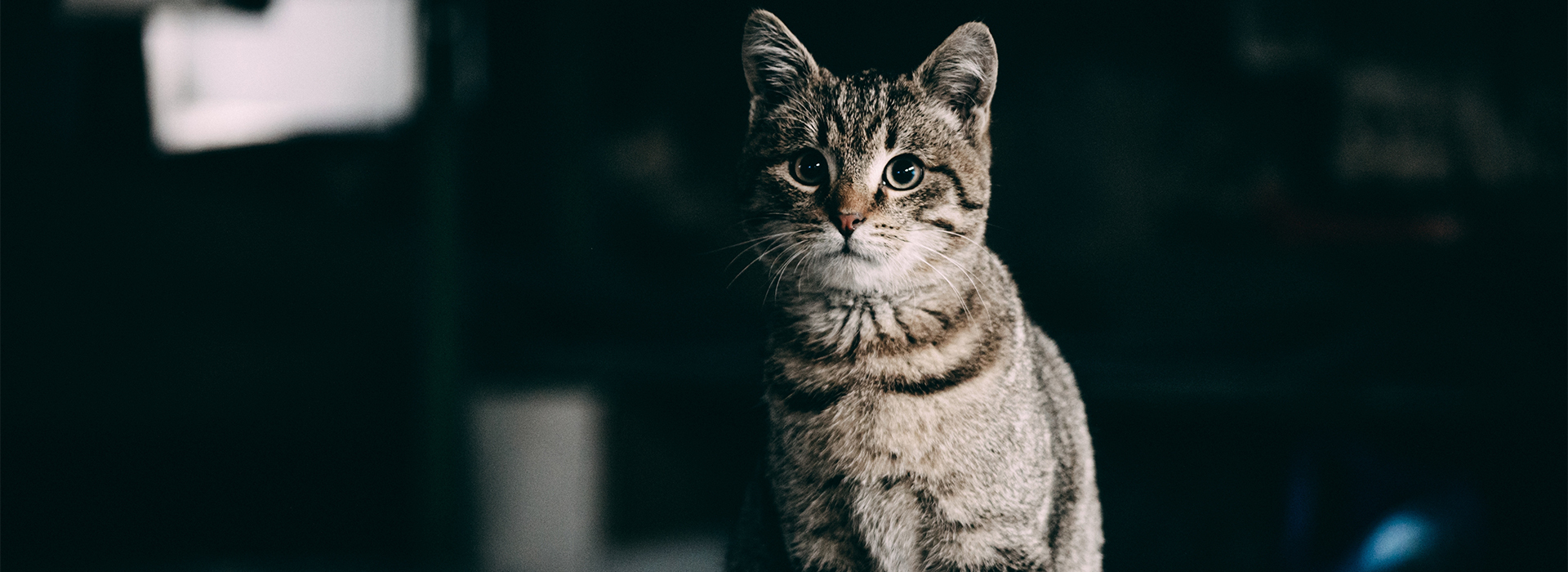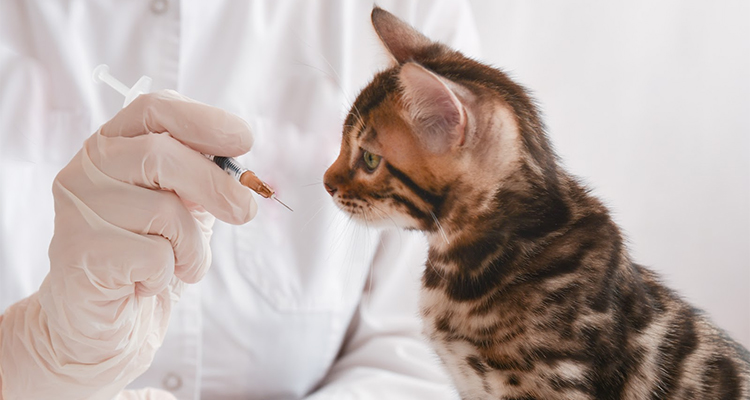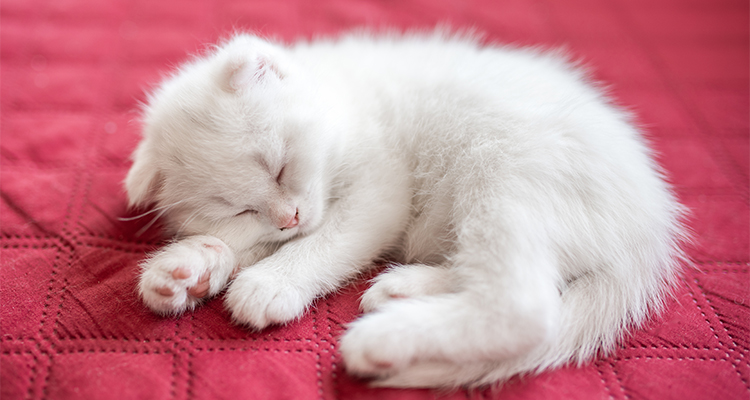

It’s a common misconception that cats are nocturnal animals. In fact, cats aren’t nocturnal, but crepuscular, meaning that they’re naturally more active at dusk and dawn rather than during the depths of night. Cats have developed this instinct to help them hunt when their natural prey is most active. It also helps cats to avoid some of the true nocturnal predators, who are active only at night, as well as many of the bigger daytime predators they may encounter in the wild. A cats’ sleep and awake cycles will therefore usually mirror this classic crepuscular pattern, and they’ll commonly cat-nap during the daytime to help conserve their energy for later on.
In this article, we’ll look at key questions, such as why people still think cats are nocturnal, if cats are crepuscular when they sleep during the day, when and how long cats sleep for, and how nutrition and behaviour can influence your cat’s sleep cycles and overall health and wellbeing.
Cat sleeping patterns
Cat sleeping patterns can vary with individual personalities, overall health, activity levels, and particularly with age. Kittens sleep more when they’re young, and older cats may have more frequent naps than young adults. Cats are known to have ‘polyphasic’ sleep cycles, which means they usually nap for one to two hours before having their active awake time.
Just like humans, cats also move through classic sleep phases: from light sleep to rapid eye movement sleep (REM), and eventually deep sleep. When they’re in light sleep ,they maintain some awareness of their surroundings and can be awoken by small noises and movements, but when they move to REM sleep, they will be starting to drift off more deeply, and may dream as their brain is still active. A deeper sleep phase is the restorative sleep that all cats need to grow or develop, repair their muscles, support their immune system, and conserve energy for their next adventure. They may then move back through the sleep phases in reverse, or alternate between REM and lighter sleep, before waking up.
Are cats crepuscular?
Although some pet owners may ask: ‘Are cats crepuscular, even when they’re awake at 3 am?’ The answer is yes; crepuscular best describes typical cat sleep behaviour. Most cats don’t stay up all night, like nocturnal animals will, but instead will want to hunt or explore during the twilight times and take naps in between. Equally, most cats won’t stay awake throughout the entire day, like nocturnal animals do, but will nap on and off. Crepuscular behaviour helps cats avoid potentially risky situations with nocturnal and daytime predators, as well as avoid the hottest - and coldest - hours. Cats’ natural prey, such as mice and birds, are also commonly active at dawn and dusk, inspiring their instinct to hunt.
Why do we assume cats are nocturnal?
Many people still believe cats are nocturnal animals as they’re often seen to be most active at night time and very early morning. They have excellent eyesight and finely-tuned senses, which allow them to see far better in the dark than we can. However, cats cannot see well in very dark conditions, which is why the calmer and quieter twilight hours suit them better. Their instinct to hunt and prowl at night comes from their wild ancestors, and by sleeping in the daytime, they can stay safe, conserve their energy, and get ready for the evening’s activities.
We humans, however, are known as ‘diurnal’, meaning we’re most active during the daytime. As we commonly see our pet cats napping for the majority of the day, we assume they’re out and about all night. However, most cats will also nap at nighttime too - we’re just usually not awake to see it.
If cats aren’t nocturnal animals, why do they sleep most of the day?
Although it may seem like some cats sleep all day long, in reality, they have a series of naps in between their waking hours. It’s thought that more daytime resting gives them an evolutionary advantage by conserving their energy for their evening hunting. It’s also part of their survival instinct to rest and repair when the sun is at its hottest, and when other daytime predators might be lurking in the wild.
Cats may seem more lethargic and sleepy during the daytime, but they should also have periods of activity. Engaging them in a game can help to satisfy their hunting drive, as well as giving them vital stimulation and exercise to support their overall health. If you’re concerned that your cat is sleeping too much, or if they appear groggy when they do wake up, it’s best to consult your vet to rule out any health issues.
Impact of domestication on sleep behaviour
For some cats, their domestic setup can alter their natural behaviour and sleep cycles. Some cats can adapt more to their humans’ pattern, of sleeping more at night and being awake more in the daytime, whereas others may do the opposite. Cat sleep cycles can be affected by excess noise during the day or night, being woken up, not having enough stimulation in the daytime, lack of exercise, experiencing discomfort from an injury or poor sleeping environment, the use of artificial lighting and heaters, or certain feeding schedules.
If you would like your cat to be awake more in the daytime and less at night, you could try engaging them in active play more frequently. Short bursts of playtime in the daytime, alongside a variety of activities to stimulate them mentally as well as physically, may help them to feel tired and more likely to rest at night time.
How does your cat feeding schedule impact their sleep?
Nutrition plays a key part in your cat’s sleep hygiene, as well as their overall health, so it’s important to choose nutritious cat food appropriate for their age. Feeding your cat at certain times can also help to support a good sleep routine, which is essential for their wellbeing.
Creating a cat feeding schedule that best suits their sleep and activity patterns may benefit you both. For example, try offering smaller meals throughout the day to encourage them to wake up and look for food, as well as time to play. You could also try giving them a final balanced meal before you go to bed, to promote deeper sleep and discourage too many nighttime escapades. It’s even better if you can add puzzle feeders or treat dispenser toys to enrich their feeding schedule, to help you enjoy fun time together in the daytime, and which will help to tire them out before night time begins.
Are Cats Nocturnal? FAQs
Why are cats active at 3am?
Cats are crepuscular, rather than nocturnal, so they’re most active at dusk and dawn. If it's twilight at 3am, your cat’s instinct is to hunt and explore at this time - when their main prey is out and about, but after many nocturnal predators start to head back to bed.
Will cats ever sleep at night?
Most cats will nap at night time, during the darkest hours, and after their evening activities have finished. Cats have shorter, more regular sleep cycles than us humans, so it’s common for them to nap on-and-off during both day and night time, whilst waking in between.
Are indoor cats nocturnal?
You may wonder: are cats nocturnal animals if they’re indoor pets? House cats are not nocturnal, but crepuscular, so they too are active at dawn and dusk. Indoor cats won’t have natural predators to worry about, so they may adapt to being more awake at night time.







